Archive for Housing – Page 2
AS ANTICIPATED, YAVAPAI COMMUNITY COLLEGE CUTS DEAL WITH PRESCOTT VALLEY’S FAIN SIGNATURE GROUP TO RENT APARTMENTS FOR VERDE CAMPUS/SEDONA CENTER STUDENTS AND EMPLOYEES AT COMPLEX NOW UNDER CONSTRUCTION ADJACENT HIGHWAY 89A IN COTTONWOOD
GOVERNING BOARD SET TO APPROVE $3.4 MILLION INVESTMENT AT MAY MEETING TO CREATE A PERMANENT FACULTY VILLAGE OF TEN HOMES FOR WEST COUNTY FACULTY
West County faculty village will be located in Lakeshore subdivision outside Prescott Valley in project being developed by the Prescott based Fain Signature Group; College says it intends to initially purchase, own and operate ten manufactured homes for the faculty who will rent them “temporarily;” students may occupy the new homes if faculty don’t rent them
The Yavapai Community College Governing Board is anticipated to approve an investment at its May meeting of an estimated $3.4 million to create a village for the West County faculty working at the Prescott Campus and centers on that side of Mingus Mountain. The faculty village will be located in the Lakeshore subdivision just outside Prescott Valley. (See video link by clicking here where Prescott-based executive explains the project.)
According to the information supplied to the Governing Board at its April 11 meeting, the new faculty village will act as “temporary” faculty housing, although “temporary” was not clearly defined in any great detail. (Representative Kuknyo did emphasize there were to be used on a temporary basis by faculty.” The College said that if faculty do not rent the homes, it will open them to students.
The decisions and discussion regarding construction of the village was kept totally secret from Yavapai County residents until the April 11 meeting. The County taxpayers will be paying for it in their annual primary property taxes.
What alternatives, if any, the Governing Board was given by the College rather than investing in a permanent faculty village are unknown as that information remains a carefully guarded secret.
It is also unknown whether the Governing Board considered setting up a rental agreement with the Fain Signature Group that would not have entailed a permanent investment. The Fain Group, for example, is just completing a 329 apartment community in Prescott Valley that could be used for “temporary housing” of Prescott based faculty.
Below is a housing statement contained in the 2022 Community College Master Plan with the photo of the housing project at San Mateo College.
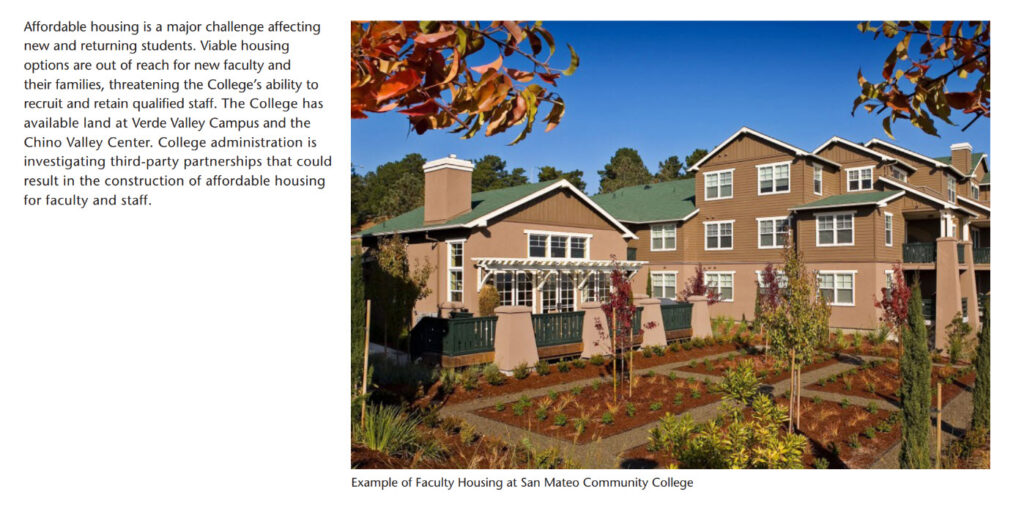
CLARKDALE NEIGHBORS KILL OFF COMMUNITY COLLEGE PARTNERSHIP WITH PRIVATE DEVELOPER TO BUILD STUDENT AND STAFF LIVING FACILITIES ADJACENT VERDE CAMPUS
Developer bails because of neighborhood opposition; College looks to its vacant 75 acres for possible new location
A Yavapai Community College tentative agreement with a Clarkdale private developer to build a housing project on five acres adjacent the Verde Valley Campus collapsed because of neighborhood opposition to the project (see sketch below). The private/government partnership would have provided badly needed housing for the first time in 50 years for Yavapai Community College students attending classes on the Verde Campus and staff working there. It would also have included housing for private families. The exact details of the proposed relationship between the developer and the College were not revealed by the at the September 27 Governing Board meeting.
Based on information supplied the Blog, the apparent strong “not in my neighborhood” reaction to the developer’s plan came during a meeting by Clarkdale retirees with town officials, college administrators, and the developer several weeks ago. The retirees seem to think the project would bring unwanted travel by autos on Black Hills Drive.
However, the Community College intends to construct housing on its own 75 acres of vacant property for students and possibly staff. As noted by the College President at the September 27 meeting, “the need for housing continues and we know if we plan to grow or add destination programs, we must have housing. So, we have decided to move housing up in the priority order” of budget expenditures.
The following is a concept sketch of the proposed housing project killed off by neighborhood opposition.
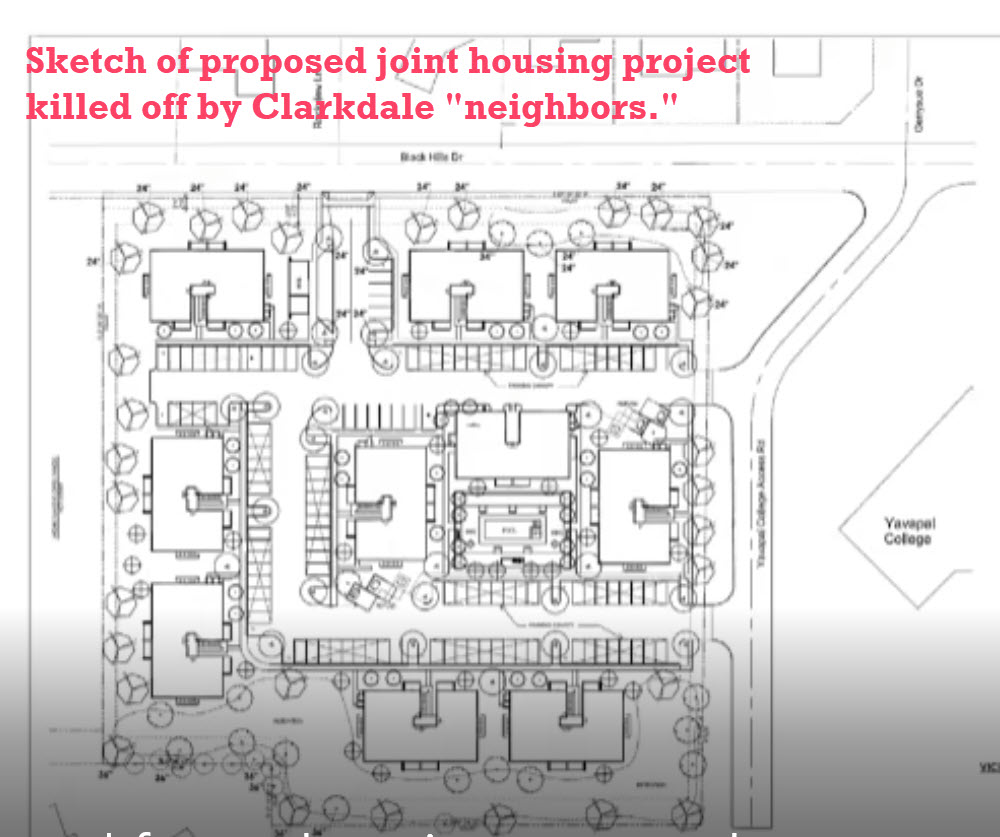
You may listen and view the entire discussion in full about this issue at the September 27 Board meeting by clicking here. The video is about 16 minutes long.
PRESCOTT BASED YAVAPAI COLLEGE EXECS, CLARKDALE MAYOR, VVREO. AND REDC MEET WITH CLAYTON COMPANY TO DISCUSS ITS INTEREST IN AFFORDABLE HOUSING ON THE VERDE CAMPUS – VERDE VALLEY DEAN AND VERDE VALLEY DISTRICT 3 REP PAUL CHEVALIER NOT PRESENT; CHAIR MCCASLAND, DISTRICT 2 REP WAS PRESENT
Clayton Company has a modular manufactured home development in Chino Valley; apparently interested in Clarkdale area of the Verde Valley
According to a brief report made to the Governing Board October 19 by Yavapai District Governing Board Chair Deb McCasland, a meeting was held earlier in the month in Clarkdale with a variety of people to discuss the interest that the Clayton Company may have in meeting the need for student residence halls and affordable faculty and staff housing in the Verde Valley.
 The list of persons attending the meeting included: Clarkdale mayor Robyn Prud’homme-Bauer; Yavapai Community College President Dr. Lisa Rhine, Yavapai Community College Vice President of Community Relations and Student Development, Rodney Jenkins; Governing Board Chair Deb McCasland; Richard Hernandez, Director of the Regional Economic Development Center; representation from the Verde Valley Regional Economic Organization; and representation from the Clayton Company.
The list of persons attending the meeting included: Clarkdale mayor Robyn Prud’homme-Bauer; Yavapai Community College President Dr. Lisa Rhine, Yavapai Community College Vice President of Community Relations and Student Development, Rodney Jenkins; Governing Board Chair Deb McCasland; Richard Hernandez, Director of the Regional Economic Development Center; representation from the Verde Valley Regional Economic Organization; and representation from the Clayton Company.
The Verde Valley Campus Dean, Dr. Tina Redd, and the Verde Valley Governing Board Representative from District three, which encompasses the Sedona Center and the Verde Valley Campus, Paul Chevalier, were not at the Clarkdale meeting. The Community College representatives present at the meeting are all from the Prescott/Prescott Valley area.
Ms. McCasland reported to the Board that she discussed with the Clayton Company and the assembled group the “need for student housing, and the need for accessible housing for faculty and staff in the Verde Valley.” She said that “they took the information and will get back to us.” Dr. Rhine did not include any comment on this meeting when she gave her President’s report to the Governing Board on Tuesday, October 19.
The Clayton Company has a development in Chino Valley, Arizona. It specializes in manufactured and modular homes. Chair McCasland indicated that the Clayton Company may have a development “near our campus in Clarkdale.”
The Verde Campus in Clarkdale has around 80 acres of prime real estate that is undeveloped. The College has not expanded its 13 acre vineyard into these acres and has recently constructed its CTE facility on a raised stone plaza rather than build it on the 80 acres, which some argue would have allowed for easy expansion. The College currently has announced no plans to create a solar farm to reduce energy consumption on the Verde Campus or to use the vacant acres for any other purpose.
A video clip of Chair McCasland’s report to the Governing Board appears below.
GOVERNING BOARD LOOKS AT IMPACT OF HIGH COST OF HOUSING AND LOW HOUSEHOLD INCOME IN COUNTY
Issues make it challenging to hire faculty, attract students
According to data gathered and reported to the District Governing Board in November by Tom Hughes, Director of Institutional Effectiveness and Research, the Community College is facing a problem of attracting faculty and students in part because of the high cost of housing in the County and low household income. The combination presents significant headwinds negatively affecting student and labor force recruitment.
Yavapai County’s median household income of 48.3 thousand dollars is 5.2 thousand below the Arizona median household income and 9.4 thousand below the national median. The following graph, presented by Mr. Hughes to the Governing Board, shows the difference in median income.
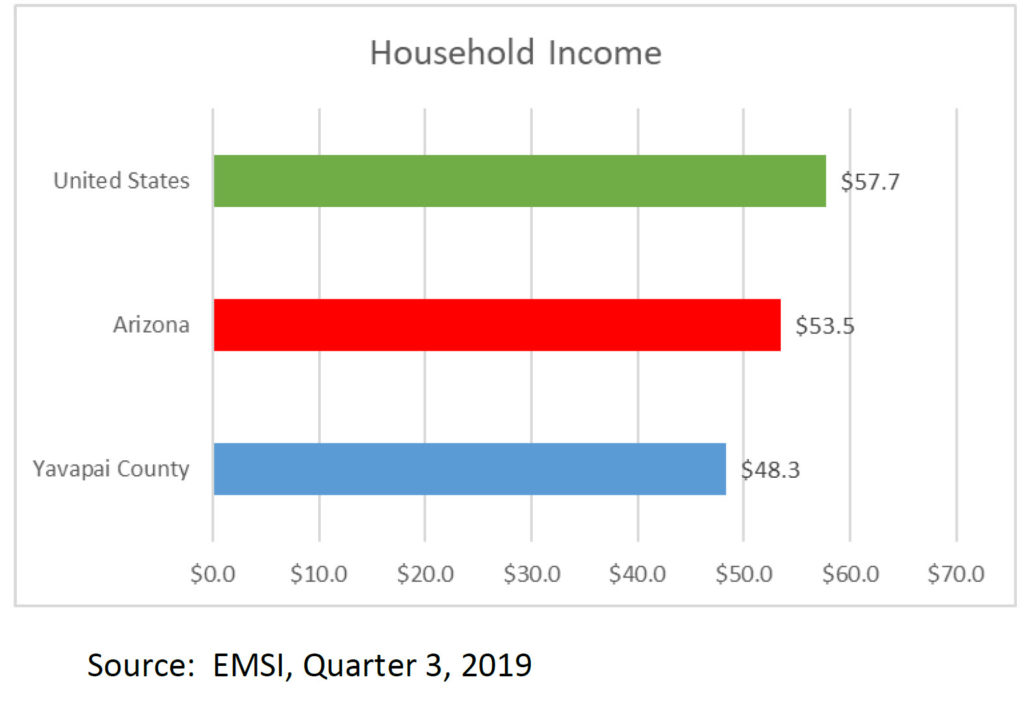
The Phoenix area is almost 11 percent less expensive than the Prescott-Prescott Valley region. The primary driving factor is housing costs. As the graph below, presented to the Governing Board shows, housing in this area is much more expensive than in Phoenix.

You may view Mr. Hughes comments about housing and the income made to the Governing Board in the video below.
Newly renovated Residence Halls opened on Prescott campus – 220 students with $7 million dollar upgrade ($31,800 per bed)
The two newly renovated residence halls on the Prescott campus were officially opened Thursday, August 21. Officials at Yavapai College celebrated the opening with speeches, tours, food and a ribbon-cutting.
ESTIMATED COST: Haley Construction oversaw the $7 million renovation of Kachina and Marapai Residence Halls. This amounts to about $31,800 per bed. Click here for full story written by Patrick Whitehurst in the Prescott Daily Courier.
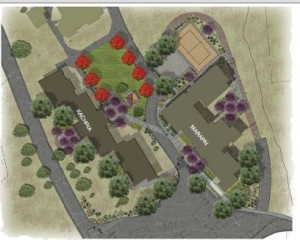
Architect’s rendering found on Facilities Management web site.
Renovations to Marapai Hall were completed earlier this month; Kachina Hall renovations were completed last year.
Kachina hall houses about 90 YC students, and Marapai hall houses 130 students. There were a number of upgraded safety and energy-saving features, new kitchen areas, common areas, laundry facilities and security features. There was also new furniture, landscaping, paint and a new roof. Residents are given a number of amenities, such as parking, pool tables, movie nights, outdoor volleyball courts and more.
REPAYMENT OF $7 MILLION: According to the Prescott Daily Courier, “monthly rent for the renovated lodgings will be $620 per month.” The College told the Courier in a news release that: “Revenue from the monthly rental cost will cover the renovation’s associated costs.” Plans are also underway to rent the housing units in the summer months for additional revenue.
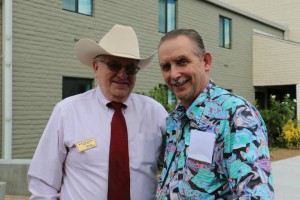
Governing Board Chair Sigafoos and Prescott Mayor Pro-tem Jim Lamerson.
Prescott Mayor Pro-tem Jim Lamerson, Governing Board Chair Ray Sigafoos, President Penelope Wills, and students addressed the gathering at the dedication. Click here for photos taken at dedication that appear on YCC’s facebook.
Students on Prescott campus move into renovated housing; no similar housing planned for Verde Valley
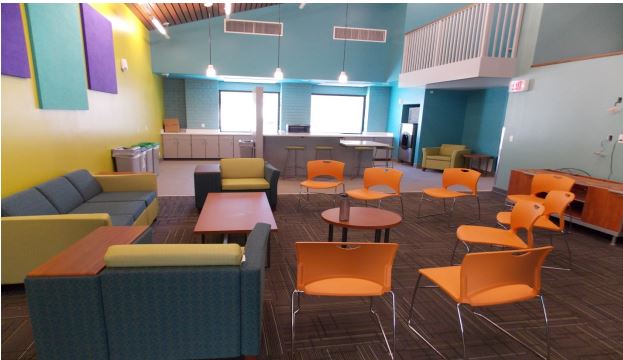
Artists concept posted by Yavapai College of kitchen area of new student housing.
The Yavapai Community College estimates that about 130 students will be living in the new Marapai residence hall dorm this semester. Another 90 students will be living in the Kachina residence, which was completely renovated last year. There are no student housing plans for the Verde Valley. Source: Prescott Courier. For artist renderings of the new facilities, please click here.
To the left is an artist’s rendering of the renovated kitchen area of one of the new student housing projects. The estimated cost for renovating the two dormitory areas is $5 million dollars. The project was approved in 2012 – 2013 by the Yavapai Community College Governing Board.
The Board has refused to construct student housing anywhere outside Prescott. This has been a major barrier to full development of the Verde campus in Clarkdale. It is in part responsible for problems with supporting the Sedona Film School, which was closed by the College this year.
Copyright © 2025 All Rights Reserved